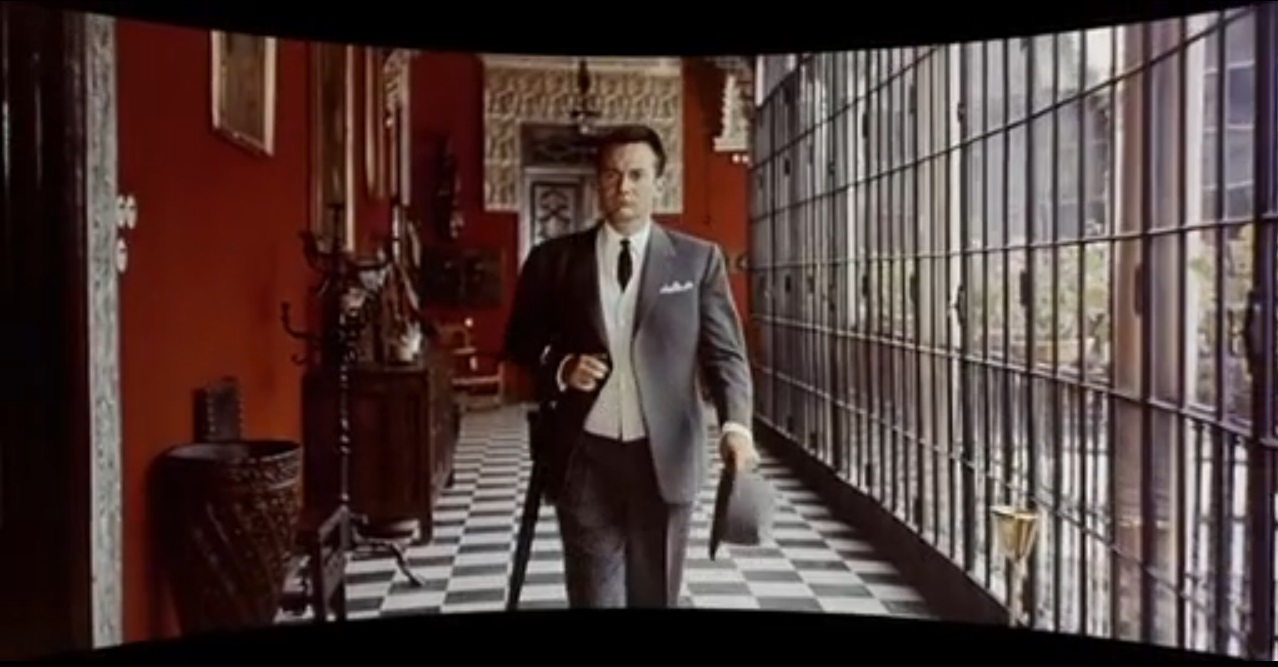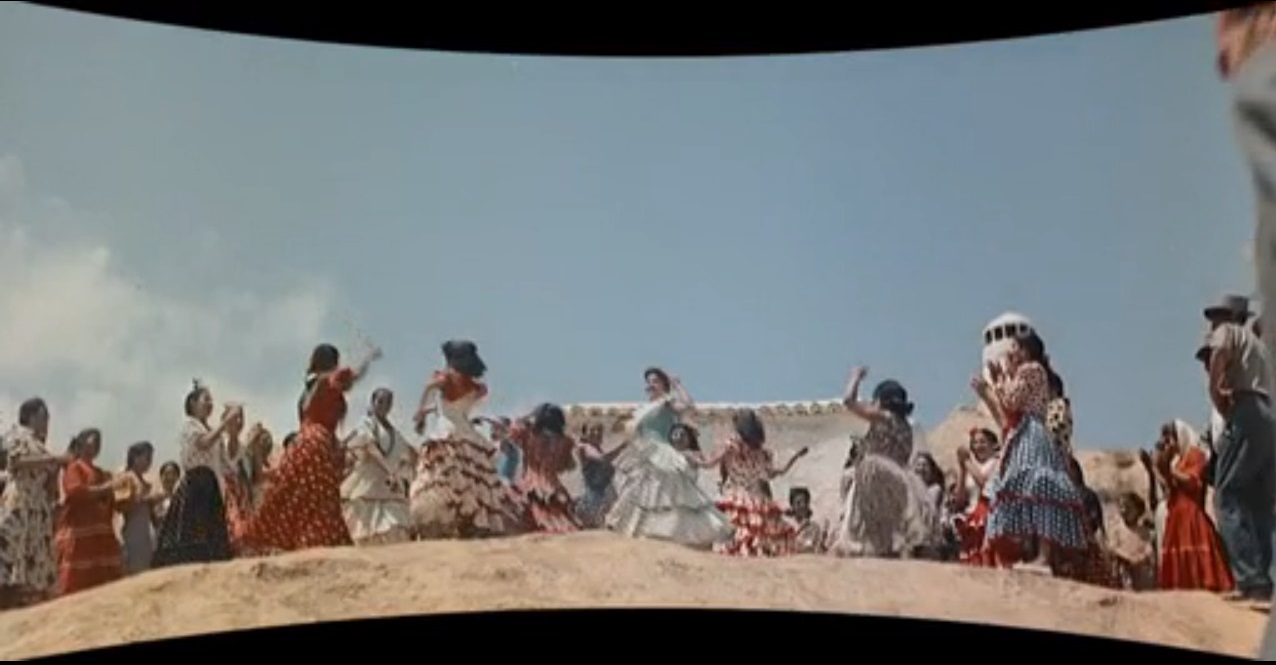Holiday in
Spain

The roadshow reissue in Cinerama with an overture by Mario Nascimbene to put you there, then an English mystery writer
too long between the boards, who dreams himself a butterfly over the Alhambra,
lighting on a rose.
“That’s
Spain for you,” Scent of Mystery,
a work of genius. “There’s probably no more to it than a girl
buying a bottle of perfume.”
|
Will you heare
a Spanish lady how she wooed an Englishman? |
Frank
Capra’s The Strong Man with
Harry Langdon has the original of the painter and her model of opportunity.
Then there’s “Sally, lovely girl for an American.” The
discussion of marriage ends in a Keaton gag from Seven Chances (and What! No
Beer?). “The trains in Spain seem mainly in my lane.” The
running of the bulls.
It is distinctly
remembered by Terence Young (From Russia
with Love) and Guy Hamilton (Goldfinger),
also Christopher Miles (The Virgin and
the Gypsy), our scribe’s hero Derek Carson is “so secret he
doesn’t even have a
number.” With his cabdriver, a sort of Cervantes acting out a chivalric
romance in defense of the girl, from what? A notable recollection of the Spanish
Civil War, perhaps.
A notable
recollection of Powell & Pressburger’s Black Narcissus among the mountain reaches of the Villa Flora,
“a matter of life and death.” The fistfight that ends Part One
suspended from a balcony with fireworks is one of many light Hitchcock touches.
The girls in the intermission song cry, “go, go!” The boys urge
them, “wait, stop!” The Seville fiesta scene is remarkably like the
Technicolor footage Welles shot for It’s
All True, and Cardiff’s imperiled heiress skipping away from pursuit
might well recall Anger’s Eaux d’artifice. So many are the gags, Peter Lorre
suggests Secret Agent, Paul Lukas
kibitzing a game of bridge Dieterle’s Grand
Slam, the taxicab out of action by the sea Huston’s Beat the Devil (from Minnelli’s Yolanda and The Thief)... a certain
Homeric laughter comes from the end of Mackendrick’s The Ladykillers with a train... “Lucky” Larker’s
flight over the rugged terrain (“now let that fluttering butterfly follow
me”) resembles another Cinerama
masterpiece, Kubrick’s 2001: A
Space Odyssey (and note the really startling resemblance of the English
aviator’s wife to Angela Molina in Buñuel’s Cet Obscur Objet Du Désir).
Screenplay
adapted from the same novelist on whom Gérard Oury and Annette Wademant et al.
sired Boisrond’s Voulez-vous danser avec moi?
(with Bardot), scene designs by Vincent Korda, cinematography John von Kotze (in one impressive up-angle conveying the sense of a
Goya), assistant director Bernard Vorhaus under a nom de guerre. A
very high plateau in the cinema, where the thematic use of aroma suggests Huysmans and the Japanese game of rare and costly incense
evoking a given chapter from The Tale of Genji.
Bosley Crowther of the New
York Times, ever the Gothamite goose, thought he
was being swindled by some rude hucksters, “there is a strong smell of
the midway... has to be classified as bunk.” Variety was not so taken in, “a fun picture, expertly
directed”. TV Guide,
“beautifully photographed”. Hal Erickson (All Movie Guide), “misguided attempt”. Halliwell’s Film Guide was not
even curious, “more of a travelogue than a thriller.”

Sons and Lovers
Cardiff’s masterpiece,
hard, bitter and cruel, went somewhat by the boards with critics. Bosley
Crowther of the New York Times praised the pictures and Trevor Howard
but had no idea of the film, it was British to him, an “emotional
monotone,” and different from the novel, which was essentially Variety’s
view as well. Tom Milne in Time Out Film Guide minces no words,
“slack and superficial... stiffly literary”.
The Lion
|
Damzel, anchoret and
ranger Share the
woodland’s dream and danger. |
The dream
departs, the game warden returns to hunting, the wife “bewitched by
Africa” goes to Connecticut with her husband and their little daughter,
raised alongside a cub.
“A depressing, patronising conclusion” in
the eyes of Time Out Film Guide, the subtle thread of argument on wilderness
and civilization having eluded it, but the New York Times reviewer
thought it was all “a distressing lot of twaddle” anyway.
The Long Ships
Cardiff’s
monumental, variegated, heroic and utterly brilliant “raid on the
inarticulate” drew a total and obstreperous blank with critics, and has
ever done so.
A
major and a minor joke. The Great Bell of Byzantium, Mother of Voices,
“tall as three men”, cast all of gold brought by Crusaders to
monks, besought by a Moorish prince and a Viking captain individually and, for
a time, together (the afterthought to this is the Three Crowns of the Saxon
Kings).
Ken
Russell much later adopted the prize narrative of the Bell at the opening, Modesty
Blaise is not very far off, The Thief of Baghdad goes into it and
some of the films Cardiff photographed as well.
Almost
incalculable, therefore critics have not reckoned with it at all.
The Liquidator
It
is all very simple, complicated as it is, a plan by M.I.5 to eliminate security
risks in the face of ongoing spy scandals, all summed up with an ineradicable
colloquy of enemy agents in Monte Carlo. “Baudelaire, I’m Chekhov.
If only we could sell the house and go back to Moscow.”
“Oh,
yes yes, of course, the password, just a minute. Life is just a bowl of cherry
orchard, no?”
“No.”
“Ah,
of course. But first we must cut down the cherry orchard.” This was not
followed by critics, it is fairly safe to say. The
assassin is a bumbling American from the war, he hires a cautious contract
killer well-known to the British and devotes his time to the ladies.
That
includes No. 2’s secretary, which ensnares him in the enemy’s
Operation Coronet.
Dark of the Sun
Very apt title,
considering the reviews. “It did not seem to me very plausible”
(Renata Adler, New York Times).
The point of the
picture, as revealed near the end, is George Stevens’ Gunga Din,
but no-one understood that picture either, and certainly not the New York
Times.
Originally it was
called The Mercenaries.
The Girl on a Motorcycle
A great Swiss
joke. The husband teaches school in a dreary French suburb next to a million
war dead, the lover’s a professor at Heidelberg, both men are Swiss.
She’s
English, it’s a gift from the professor, she rides it to him.
And along the
way, she thinks...
“It is just
too much,” said Renata Adler (New
York Times), deprecatingly.
The Freakmaker
This title, in
place of The Mutations, would seem to have been added because critics
saw no relation to Browning’s Freaks, neither did they notice
Corman’s The Little Shop of Horrors in Cardiff’s masterpiece
on vegetable man, nor Kenton’s Island of Lost Souls.
A.H.
Weiler’s review in the New York Times is indeed moronic, and so is
the one in Time Out Film Guide.